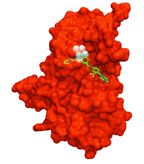Ponatinib Receives Marketing Authorization in Europe for CML and Ph+ ALL
ARIAD has received marketing authorization from the European Commission for ponatinib (Iclusig) in chronic myeloid leukemia and acute lymphoblastic leukemia.
ARIAD Pharmaceuticals has received marketing authorization from the European Commission for the chronic myeloid leukemia (CML) therapy ponatinib (Iclusig). The approval is as an orphan medicinal product and has indications for both CML and Philadelphia chromosome–positive acute lymphoblastic leukemia (ALL).

Ponatinib; source: Ariad Pharmaceuticals
The company requested accelerated approval of ponatinib in September 2012, following a similar request to the US Food and Drug Administration (FDA). The FDA granted the approval in December 2012.
Ponatinib is now approved in Europe specifically for use in adult patients with CML in chronic phase, accelerated phase, or blast phase; patients must be resistant to dasatinib or nilotinib, or be intolerant to those drugs and be ineligible to receive imatinib. It is also intended for patients with the T315I mutation. For ALL patients, all must be Philadelphia chromosome–positive and be resistant to dasatinib, intolerant of dasatinib, and ineligible for imatinib, and also for those with the same T315I mutation.
“We are delighted by the rapid approval of Iclusig in Europe and will now work closely with the national health authorities to make Iclusig available,” said ARIAD CEO Harvey J. Berger, MD, in a press release. Approximately 7,000 individuals per year are diagnosed with CML across Europe.
The approval by the European Commission, as with the FDA approval in December, is based on the PACE (Ponatinib Ph+ ALL and CML Evaluation) phase II trial. The trial included 449 patients with varying phases of the two leukemias who were intolerant or resistant to other tyrosine kinase inhibitors. In patients with chronic phase CML, 54% achieved a major cytogenetic response; among patients with the T315I mutation, the rate was 70%. Patients with advanced disease also fared well: 58% of accelerated-phase CML patients achieved a major hematologic response (the primary endpoint of the trial for patients with advanced disease), as did 31% of blast-phase CML, and 41% of Ph+ ALL patients.
In the press release, Sandy Craine, director of the CML Support Group in the United Kingdom said that “the accelerated approval of Iclusig is very positive news and underscores the need for new medicines. This approval is a significant step in giving hope to patients coping with CML and Philadelphia-positive ALL.”
2 Commerce Drive
Cranbury, NJ 08512
All rights reserved.